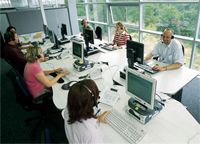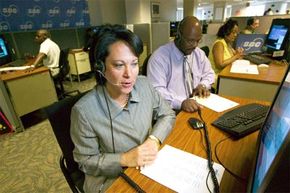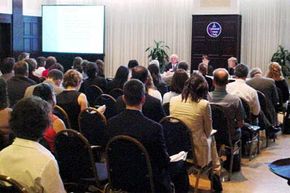Confidence and selling ability go hand in hand. Building confidence can be tricky, but having a good understanding of your product, your competition, and the most effective sales techniques can help build that confidence and make an average sales rep into a star performer. A good training program for your sales reps can help them in numerous ways. You need to conduct training not only about your own products, services, company history, and existing clients, but also about selling techniques, technology, and software.
Ongoing and useful sales training is one of the most beneficial things you can do for your sales staff. It can have tremendous impact on sales and keep your staff "on their toes" as far as new and potential client needs and new techniques in the sales world go. By ongoing, we don't just mean annual training. For many companies, annual is the most they ever do, but the real benefits come with more regularly scheduled training sessions that build on each other. For instance, you may choose to talk about a specific sales technique as it applies to your product line in the first session, and then build a cross-selling technique onto it in the next session.
Keys to Successful Training
The keys to making your sales training effective lie partially in how you present the training to your staff. One of the most important things to get across is how this training is going to increase your reps' sales, as well as benefit the company. In other words, what's in it for them? Make specific statements about how using this new technique can improve the percentage of closed sales by X% (Of course, making sure you know your statistics is important, too!). Or, how it can improve customer satisfaction by X%, which will in turn pull more sales from those happy customers.
Another key element of your training is making it interesting and entertaining. You don't want your staff snoozing through your brilliant PowerPoint presentation any more than they want their prospects snoozing through theirs! Make sure you (or whomever you hire) are entertaining enough to keep everyone awake, and more importantly, interested!
Give specific examples about how to use the new techniques. Tell stories that realistically reflect your product and market. Be overly prepared for questions and have multiple scenarios in mind to illustrate your points. Make all of your training information specific to your product and your market.
Make sure everyone participates. What they "do," they "learn." Simply listening to an idea about how something should be done is never as effective as practicing it. Also, encourage participation in the discussion. Have everyone come in with a list of questions from prospects that have stumped them, as well as some answers they've given that have landed the sale. Then have discussions about these problems and keep track of the solutions that come up.
Handouts (or e-mails) that recap some of the best ideas that were generated from the meeting can be sent out for reference later. You can also use this information to build a database of questions and answers that can be accessed electronically when a sales rep is stumped.
Some final points in training include:
- Encourage and motivate your sales staff through enthusiasm and on-target information.
- Keep it lively!
- Provide useful information, and make sure they understand why it is useful.
- Make it specific.
- Make future sessions build on techniques learned from preceding sessions.
- Have a reward system for those reps who have used the new techniques and been successful.
- Set up regularly scheduled training sessions.
For more information on building a sales team and related topics, check out the links on the next page.







